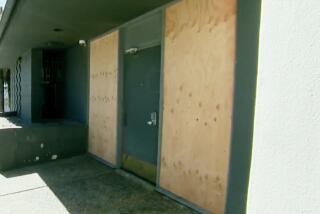Arson Hits Synagogue in Moscow : Anti-Semitism: Visiting L.A. rabbi sees link to attempted recovery of religious books.
MOSCOW — American Rabbi Boruch Cunin arrived at Moscow’s Agudas Habad Synagogue on Monday to find one room of the house of worship charred, allegedly by arsonists who want to frighten his group out of Russia and back to Los Angeles.
Just a few days before, a blood-red sign saying “Death to the Yids!” and swastikas were scrawled next to the front door of the synagogue, headquarters of the Lubavitch Habad community, an Orthodox Hasidic Jewish movement.
Cunin, of Los Angeles, said he is convinced that the two blatantly anti-Semitic acts were attempts to make him and his team leave Moscow. Since November, 1990, Cunin and a small group of rabbis from America and Israel have been fighting for the return of the 12,000-volume Schneerson collection of religious books, which was confiscated and made part of the Lenin Library more than 70 years ago.
“They thought this would scare us away,” said Cunin, who has a long beard and wears a knee-length black jacket and fedora in the typical style of his religious movement. “But until they give us our books, they will not get rid of us.”
The incidents at Moscow’s Habad Synagogue took place as anti-Semitic acts in Moscow and throughout the former Soviet Union are becoming more frequent. Political conservatives chant anti-Semitic slogans at rallies, blaming Jews for all their country’s troubles. Russian ultra-nationalist newspapers print anti-Semitic articles and caricatures that picture “yids” as half human, half rat.
“The temperature of hate has become hotter and hotter,” said Yuri Semenovsky, a director of the Moscow office of the Russian-American Bureau for Human Rights, which was founded by the Union of Councils of Soviet Jews. “Maybe (the synagogue fire) is a new level of anti-Semitism. We don’t know for sure, but we’re scared.”
A workman who was at the synagogue at the time of the fire said he heard the sound of breaking glass, ran toward a room off the sanctuary, broke into the room and saw that it was full of smoke and flames. Later he found a kerosene canister outside the broken window.
“I talked with a woman who saw two men running away,” said Yevgeny Dubosarsky, the worker.
But local police and fire officials said there was no sign of malice.
“It wasn’t arson,” said Renat A. Sudapin, the chief of the local police station. “No evidence has been found to indicate such.”
The duty officer at the Moscow fire department headquarters also played down the incident, saying: “The fire at the synagogue was so small that it had been put out by the time our unit arrived. Our men did not find anything to show that it was arson.”
Cunin cursed the police and said he had asked them for protection after the threatening graffiti were scribbled on the synagogue but that they had all but laughed at him.
The only reason the synagogue did not burn down, the rabbi said, was that two carpenters working overtime to finish an ark before Passover called the fire department and started putting out the blaze themselves.
“Thank God they were here or this whole building would have gone up!” Cunin exclaimed.
Cunin said he believes that the arsonists poured kerosene into that particular room and set it on fire because they knew that the files documenting the rabbis’ struggle for the Schneerson books had been kept in that room. (Fortunately, he added, those papers were removed two days before the fire.) Also, the rabbi who usually sleeps in that room to guard the synagogue was in St. Petersburg.
“Thank God the rabbi who should have been there was in Leningrad slaughtering chickens,” Cunin said, using the old name for St. Petersburg.
The Habad Synagogue, built before the 1917 Bolshevik Revolution, was forcibly taken from its congregation during a Rosh Hashanah service in 1939, during dictator Josef Stalin’s campaign to close houses of worship. It was restored as a synagogue only last August.
Cunin said the fire and the graffiti are clear indications that anti-Semitism is becoming more flagrant.
“The byproduct of the new freedom in Russia is the freedom to be anti-Semitic openly,” said Cunin. “We have the same things in America as well.”
The West Coast headquarters of the Lubavitch Habad movement in Los Angeles, which Cunin heads, was burned down in May, 1980. Fire department officials initially said the fire had “suspicious origins” but later ruled out arson.
The main motivation for the Moscow arsonists, Cunin speculated, was not general anti-Semitism but the specific goal of making him and his team forget about the Schneerson collection, a library of religious books from Lubavitch, a town near the Russian-Belarus border where the movement’s leaders lived before the Russian Revolution.
Despite court decisions in their favor and support for their cause from officials as high-ranking as Secretary of State James A. Baker III, the rabbis have not yet succeeded in getting their volumes out of the Lenin Library, which was recently renamed the Russian State Library.
According to Cunin, one judge found in favor of the rabbis, but he was later overruled. A deputy prime minister ordered the books returned, but the legislature nullified that action. Russian President Boris N. Yeltsin told Baker in February that the books would be given to the rabbis, but more than six weeks later, they are still waiting.
“No one really knows where we are in our battle for the books,” Cunin said. “But we will not be intimidated. We will not give up.”
More to Read
Sign up for Essential California
The most important California stories and recommendations in your inbox every morning.
You may occasionally receive promotional content from the Los Angeles Times.









